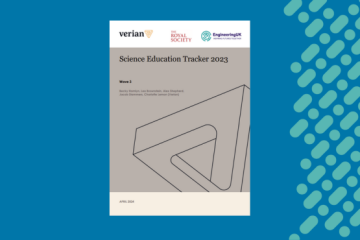Latest evidence highlights decline in access to practical science

The Royal Society in partnership with Engineering UK have published the latest iteration of the Science Education Tracker. The Science Education Tracker is a survey of young people’s attitudes towards and experiences of science education and careers. This is the third wave of the Science Education Tracker, supported by Wellcome, and it surveyed 7,256 students between years 7 and 13 (aged 11–18) in state-funded schools and colleges in England during the period 4 July to 3 September 2023.
Decline in practical work
ASE is disappointed to read that despite 71% of year 7-11 respondents wanting to do more practical science work, access to hands on practical work has declined. The proportion of years 10–11 (GCSE) doing hands-on practical work at least fortnightly dropped from 44% in 2016 to 26 % in 2023. The report also highlights that doing practical science is a key incentive to learn science for students in years 7–9, with 52% choosing this as a motivating factor.
Drop in interest in science particularly amongst girls
Worryingly, the report also shows a drop in students’ interest in studying science. Interest has declined from 76% to 71% for years 7-9 and a clear gender gap has developed, with a sharper fall in girls interest to 65%.
What are ASE doing to promote practical science and inclusion?
This latest survey is further evidence of the crisis in practical science (see also the Royal Society of Chemistry’s State of Science Teaching 2023 survey). ASE has been actively working to address both access to and confidence in delivering practical work and to share best practice around inclusion in science.
ASE’s Keeping Science Practical project, funded by The Wolfson Foundation. This programme aims to increase access to frequent, varied and purposeful practical science - through support for science educators in schools in difficult circumstances. Programme participant institutions receive extended support covering advice, CPD opportunities and educational resources all geared to enhance their provision of practical science in the classroom. 72 schools completed the programme over years 1 and 2. 88% of respondents in the evaluation survey agreed that purposeful practical science had increased as a result of project participation. Increasing confidence and skills in delivering practical science, remains a strategic priority for the ASE and we hope to deliver more on this work in the coming year.
ASE’s Inclusion in Schools Programme (delivered through the Science CPD Partnership and funded by the DfE) worked with 99 secondary schools in 2022/23. The programme works directly with teachers to support an inclusive approach and to create bespoke action plans, helping teachers gain understanding about why some students may not engage with science and ways to address this. 99% of participating schools gave positive feedback on the CPD, with 15% seeing an increase in A-level physics uptake.
Continued investment required
Lynn Ladbrook, ASE’s CEO made the following comment:
‘We know how important practical science classes are to students' understanding and application of science. Practical science lessons inspire creativity, curiosity and critical thinking. They promote retention of knowledge and help pave the way for a future in STEM careers - yet a large proportion of student's are missing out on these valuable opportunities and the impact will be felt for generations to come. This latest survey provides yet more evidence, if more were needed, that there is an urgent need for a reform and investment in our approach to science education in the UK such that all students have the best possible access to explore, experience and excel in the world of science.’
We have recently published our ‘Pledges for the next government’ document, which outlines our priorities for the next government to secure a brighter future for science education.
Further information
If you are interested in discussing ASE’s work in this area contact info@ase.org.uk
